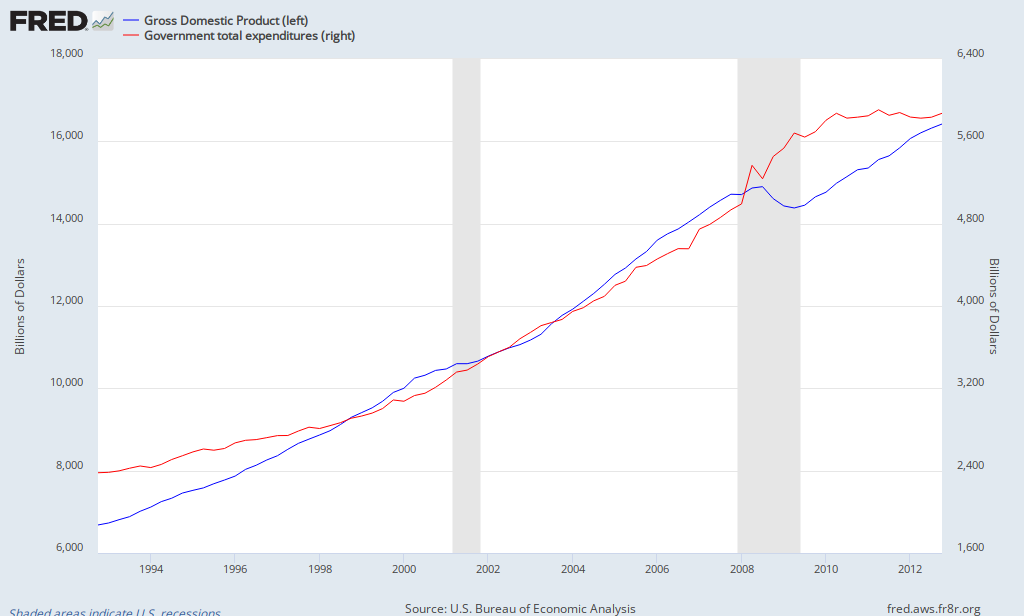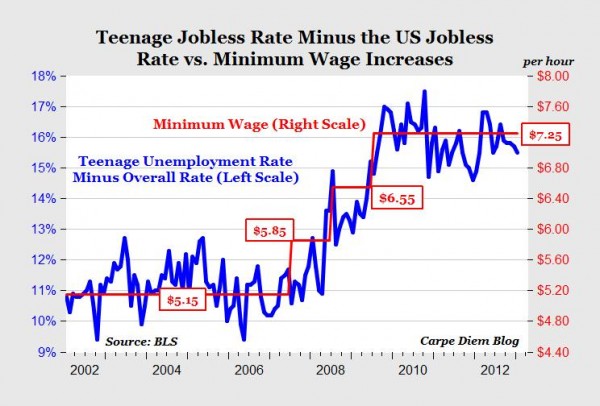The discussion is still raging and
now the mudslinging and nastiness has begun, which is really sad. I thought I'd write a post highlighting the critical points from my perspective and some of the reasons why nobody has abandoned good economic science if they are skeptical about the idea that the minimum wage hurts workers. For the record, my personal view is that the minimum wage has no real effect on employment or maybe a slight negative effect. Although I don't think the evidence seems to show a positive effect on employment, I think the theories that the "positive effect" crowd point to are probably critical for getting the "no effect" result.
First I'll talk about the empirics, then some theory, then some thoughts on the discourse around the issue.
Empirical strategies
Bob Murphy and
Ryan Murphy (no relation) both give us a look at the state level data, comparing states that have minimum wages higher than the federal minimum wage with those that don't. David Henderson also
favorably shares a comment from Krugman's comment section that talks about
a time series of teenage employment from Casey Mulligan as "
empirical evidence that the last increase in the federal minimum wage... really did increase unemployment among the least skilled" such that Krugman needs "
magical progressive fairy dust" to justify his position. Now I know Bob, Ryan, David, and Casey understand the problems and limits of these sorts of approaches, but this all seems to give the impression to people that this gives us our answer - so it's worth pointing out why methods used by guys like Card and Krueger are celebrated and widely appealed to in issues far afield from the minimum wage (for example, even guys like Don Boudreaux and Russ Roberts favorably cite people like Valerie Ramey and Robert Barro when they use very comparable methods to get at fiscal multipliers).
Minimum wages, like most things in economics, are not randomly assigned. Time periods with higher minimum wages are different from those with lower minimum wages and states with higher minimum wages are different from states with lower minimum wages. So the trick is to find an exogenous (essentially, a random) change in the minimum wage and to clean out the other correlates of minimum wage levels.
Bob and Ryan's approach doesn't help here. Yes, California and Mississippi have different minimum wages, but there are a lot of other things different about them that a simple comparison is going to pick up. These other things may be causing the minimum wage, or they may be completely unrelated to the minimum wage, but they could still be picked up in the minimum wage variable.
The most natural solution has two parts to it. The first is not to look at minimum wage
levels, but to look at
changes in the minimum wage. Presumably these are sufficiently discrete that they are not caused by changes in ideology, price levels, demographics, etc. Second, you'd like to do this exercise for very similar local economies - one that changed the minimum wage, and one that didn't. This helps you to identify a counterfactual using the state that did not change its minimum wage, so you compare the changes in the state that did change to the state that did not. This approach seems to be our best bet for getting a clean estimate of the effect of the minimum wage, and this was exactly
Card and Krueger's (1994) approach. That paper isn't the end of the discussion, but it is rightly considered a classic. People reading critical libertarian blog posts on the issue should not be confused about the fact that this is an important paper and rightly respected paper.
If you were convinced by Bob Murphy's data work, just ask yourself - (1.) didn't a lot of those minimum wage states also have big housing busts? (2.) don't they have a lot of other progressive policies or regulations that might be driving this? (3.) hasn't there been an oil boom in some of the lowest teen unemployment states? (4.) don't these teen unemployment rates correlate well with general unemployment rates and might that be caused by some other common cause? (5.) don't the lowest teen unemployment states on his list have a lot fewer minorities?
The Card and Krueger study isn't perfect, but it doesn't have any of these problems which in my opinion make Bob and Ryan's approaches non-starters.
You may be hearing a lot about a more recent study by
Dube, Lester, and Reich (2010). The point of this paper is to generalize the Card and Krueger approach to differences across many more borders than the Pennsylvania/New Jersey border:
They have helpful slides for the paper
here.
The study finds "strong earnings effects and no employment effects of minimum wage policies". The sentence is worded carefully - since they use data derived from payroll data, they cannot parse out the hours component of earnings and the wage component. If you've done any digging into the Employment Policy Institute work on the subject, as I have over the last couple days, you'll know they make a big deal of the fact that Card and Krueger look at employment rather than hours. The fact is, hours are hard to get except in household surveys and those surveys present their own problems around reporting as well as the local geographies we'd be interested in for a minimum wage study. Since payroll data only has earnings, Dube, Lester, and Reich may be picking up an increase in the wage plus an offsetting decline in hours leading to a total increase in earnings. That's possible, but it's not clear what's going on. You have to decide if you ultimately care about hours or earnings.
As far as I know, this is the best study to date and it confirms the meta-analytical finding from the Economic Policy Institute that I shared the other day: the minimum wage does not have a discernible employment effect.
Miscellany
There are a few odds and ends on the empirics that have bugged me the last couple days that are worth noting.
- If you insist on thinking about cross-state studies rather than more local geographies, I think it's critical to consider price levels. Massachusetts has a state minimum wage higher than the federal minimum wage and Alabama doesn't, but does this mean the Massachusetts labor market is more constrained? I don't know, honestly. One of the major reasons why Massachusetts has a state minimum wage is that its price level is higher. The real value of the two minimum wages may well be higher in Alabama. Certainly they are closer than the nominal values suggest. If you look at local geographies these problems are largely accounted for, but at the state level its a bigger deal and really messes with making much of state minimum wages.
- I think we need to do more critical thinking on the nature of our dependent variable. My quick read of some of the criticism of Card and Krueger suggests that hours may respond more substantially than employment to the minimum wage. This sort of divergence of effects has come up in my own research on job creation tax credits, and its worth thinking about what we think of that, particularly given the importance of joblessness at young ages for labor market prospects later on. This difference between the extensive (employment) and intensive (hours) margin pops up a lot in the macroeonomics of labor.
- Dube, Lester, and Reich also find that the minimum wage leads to sharp declines in turnover. A common explanation is that its an attempt to reduce turnover costs for firms. Another explanation I haven't heard, but which might be the case, is that it's an efficiency wage effect that prevents workers from shirking or quitting. If we think frictional unemployment is important in these labor markets, reducing turnover in teenage labor markets could have important long-term payoff.








